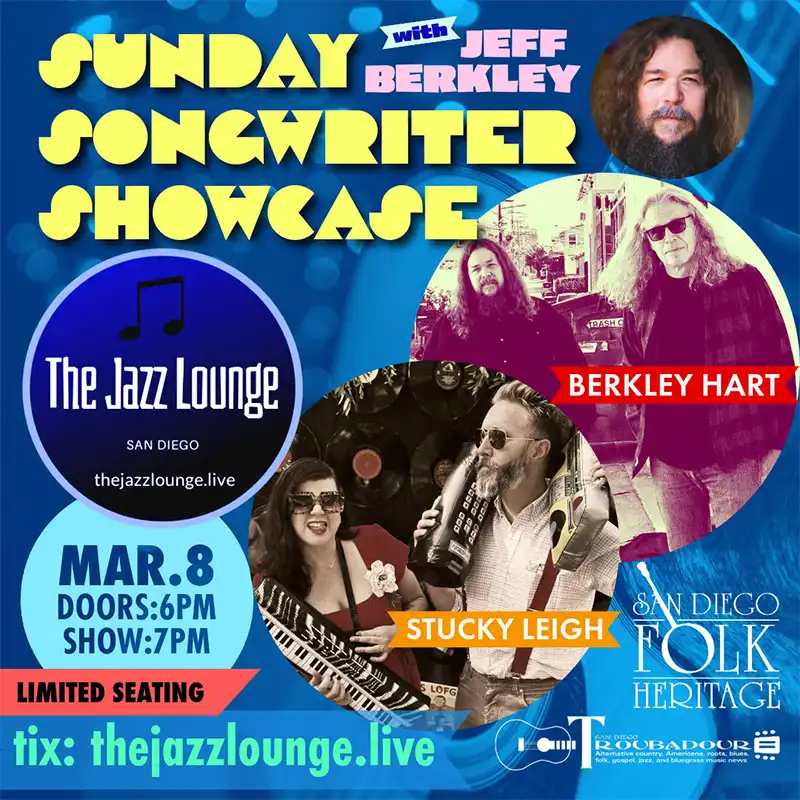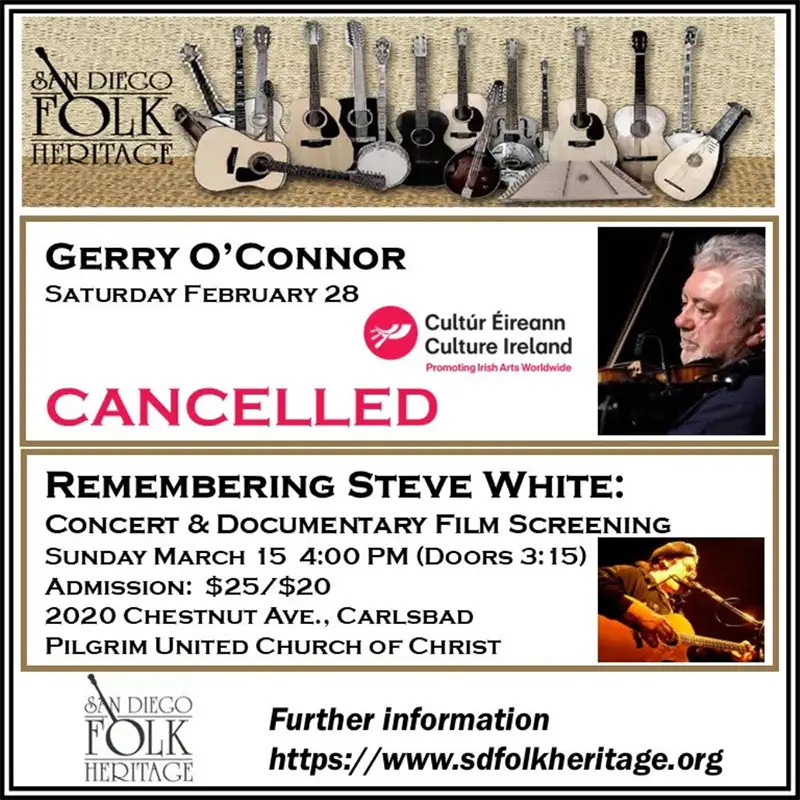Cover Story
Jonny Tarr: Life, Music, and The Rules
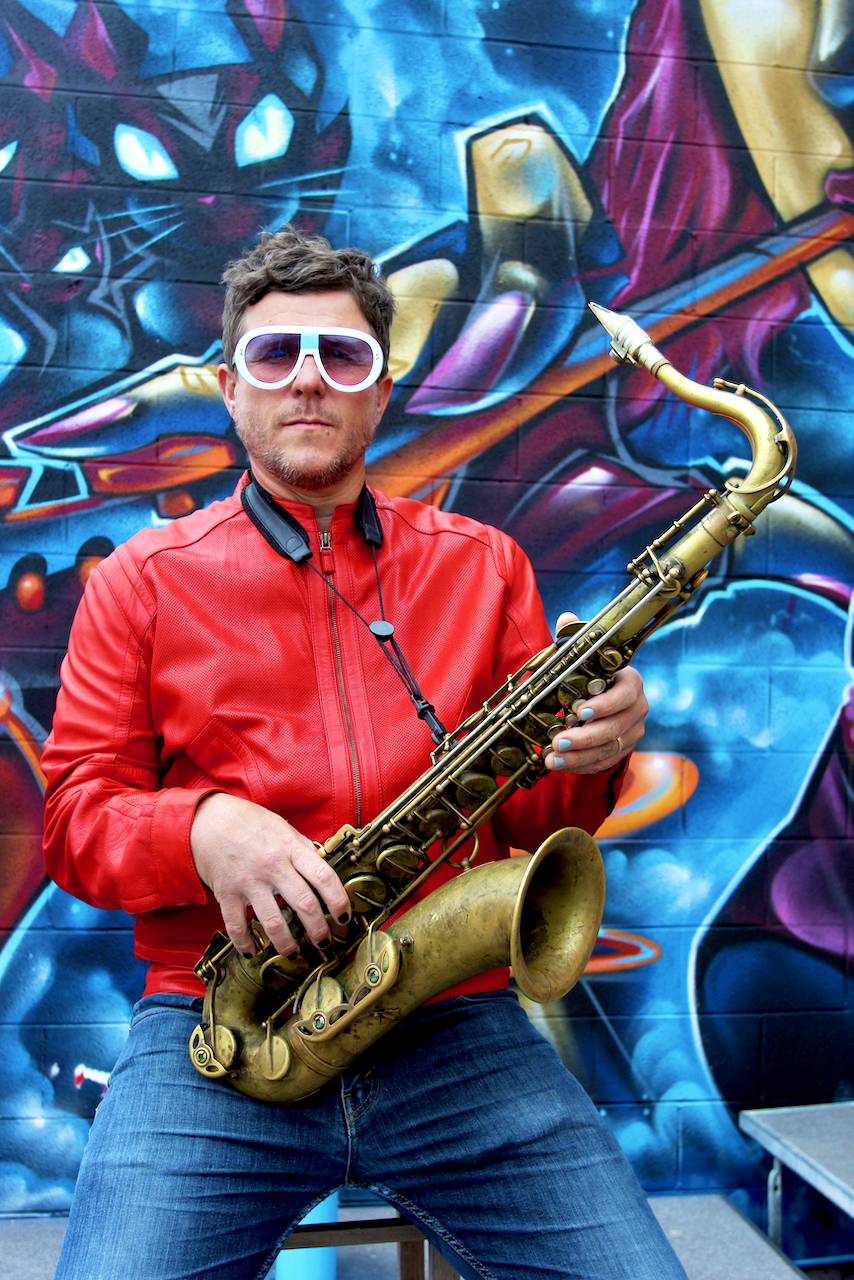
Jonny Tarr. Photo by Dan Chusid.
Quite a few performers have relocated to San Diego to become part of the music community, but few have made the impact that multi-instrumentalist Jonny Tarr has. A native of Cardiff, Wales, since his arrival with his wife, Aleicia, in 2011, Tarr has become one of the area’s top draws, scoring four San Diego Music Awards in the process, all while taking part in enough musical projects that fans need a score card to keep track.
Signed to Pacific Records, Tarr’s sound is a dance floor friendly mix of funk, R&B, pop, jazz, and a splash of rock. How does Tarr describe his music? “The million-dollar question!” he said. “Recently I have been describing it loosely as a combination of the Killers, Maroon Five, and the Weeknd, but perhaps my vocals are probably more reminiscent of Sting than any of those guys.” Tarr is influenced by a wide range of artists. “I would include on that list people like Jamiroquai, Stevie Wonder, the James Taylor Quartet, Miles Davis, Wayne Shorter, Marvin Gaye, Michael Brecker, and many others. But then I also take my influences from a lot of electronica such as Vangelis, Jan Hammer, Air, and Daft Punk.” Tarr also gets inspiration from other loal artists.
“I must also give shout outs to some of the San Diego musicians who have affected my writing in some way or another, including My Mynd, Coastal Wolve, and Monette Marino.”
Tarr’s next big gig will be on Sunday, July 21, when he takes part in the Pacific Records Showcase, as part of the Concerts on the Green Community Day at Kate Sessions Park in Pacific Beach. The music starts at 3pm.
Coming to San Diego
Tarr landed in San Diego on May 2nd, 2011, but it was not his first visit. “I had been to the USA a number of times before I got to see San Diego, and had always loved it,” he said. “I was a very keen skateboarder when I was in my teens and had always resonated with the California lifestyle, so I was always harassing my mum to take us on holiday there, which she did for the first time when I was around 17.” Tarr was 31 when he first made it to San Diego. “I was actually traveling around the U.S. on a very irresponsible three-month vacation with my girlfriend at the time,” he recalled. “We started in New York City and made our way all the way down the East Coast to Florida and Louisiana, and then across to California where I had a very good friend who had just moved out here. He was living in Encinitas, so I went to visit him to play some music and see if a permanent move was a possibility. I instantly fell in love with the place. I just knew at the back of my mind that I was going to end up here.”
Tarr saw the move as a big opportunity. “I really don’t want to sound trite, but I came looking for a new life,” he said. “My music career in London had kind of fallen apart. Due to the recession in Europe, I had lost all my gigs and was working as a theater stagehand to make ends meet. I was cycling to work at around 6am one morning and it was so cold it literally made me cry. I thought to myself, ‘you know what? If I am gonna be broke, why don’t I at least do it somewhere sunny?’ So, I had been here a couple of times before, but this was the time I arrived and didn’t go back.”
Early Days
Tarr was born on March 9, 1976. “The year of the Dragon,” Tarr noted. “I like that. It makes me sound magical and dangerous,” he said with a laugh. Family did play a role in his musical upbringing, but his actual inspiration for becoming a musician comes from a less likely place. “Strangely enough, the thing that really got me into music was not really music itself,” Tarr said. “If anything was the root, the nucleus of my passion for music it was the film The Blues Brothers. I was just starting to find my voice as a novice saxophone player when I saw this film and kind of unconsciously decided that this was what I wanted to do. The whole story of two guys trying to get their band back together, plus the fact that the music was all ‘saxophone friendly’ and soulful really appealed to me.” He considers Cardiff’s musical environment as important to his education as a performer. “My hometown in Wales is a very multicultural city, so jazz, blues, R&B, and reggae were what I was brought up with. In the UK, we call it MOBO. ‘Music of Black Origin.’”
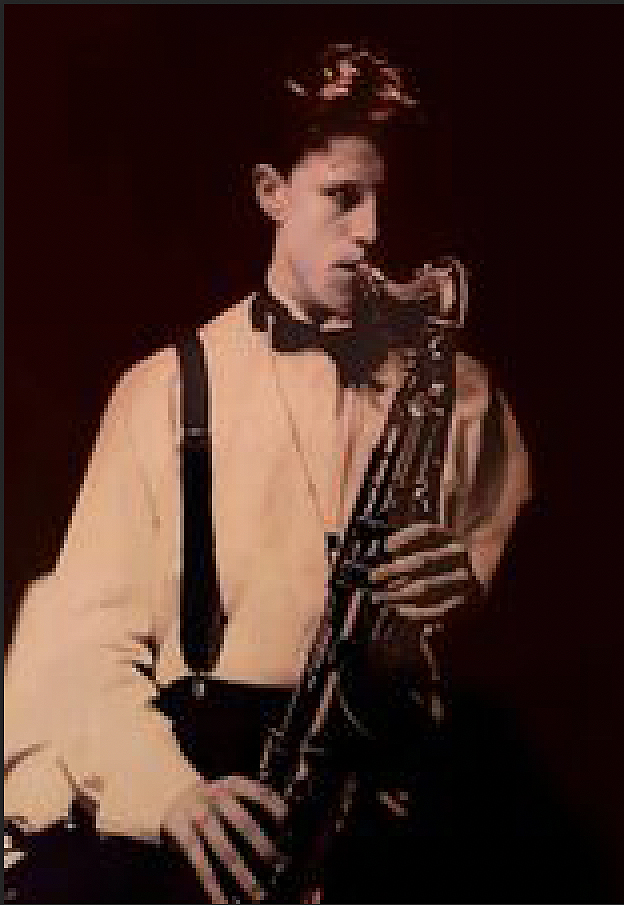
Jonny Tarr at 16.
Both Tarr’s parents were involved in the arts, though not as performers themselves. “My mum was a teacher for 30 years in South Wales and when she left that job, she moved into being the on-the-set tutor for child actors in movies,” he explained. “Some children would have to be on set for weeks at a time and so the production companies are legally required to have someone qualified to oversee their schoolwork and make sure they don’t fall behind.” Tarr’s mother was even involved in some of the Harry Potter films. “My Mum was the reason I got into music in the first place,” he continued. “She was taking piano lessons when I was around seven or eight years old, and she would take me along. She never really kept up with the piano, but I started taking lessons shortly afterward and that was my introduction to learning an instrument.” Tarr considers his mom to have “always been my biggest supporter. When I was starting out and couldn’t really afford the various pieces of equipment I needed, my mum would always find a way. We were not wealthy by any stretch of the imagination, but my mother is very resourceful and very hard working.”
Tarr’s father passed away in 2020, while the family was on an extended visit back home. “Part of the reason we went back was that my dad was very ill and we kind of knew that he didn’t have too much longer,” he said. “During his life he traveled all over the world as one of the head stage technicians for the Welsh National Opera, so theater and music were a pretty big part of my childhood. He himself was not musical but he was around great music all the time for his job, so a little of that would have rubbed off me no doubt.” Tarr and his brother, Riche, also performed in a few of those operas.
It was through one of Tarr’s father’s close friends, who was a woodwind and brass repair man, that he obtained his first instrument. “When it came to me asking for a saxophone at around the age of 11, dad asked his mate, and he donated a cheap tenor sax for me to get started on.”
Tarr’s brother plays drums but not in any professional gigging capacity. “He kind of plays like Dave Grohl if I had to compare him to someone,” he said. “He is really good, actually. He had also just started DJing as he is very into the whole electronic rave music scene. We used to play original music together, but we just ended up arguing about it constantly. It was not a good fit. We made the Gallagher brothers from Oasis look like Bert and Ernie.”
Instrument of Choice
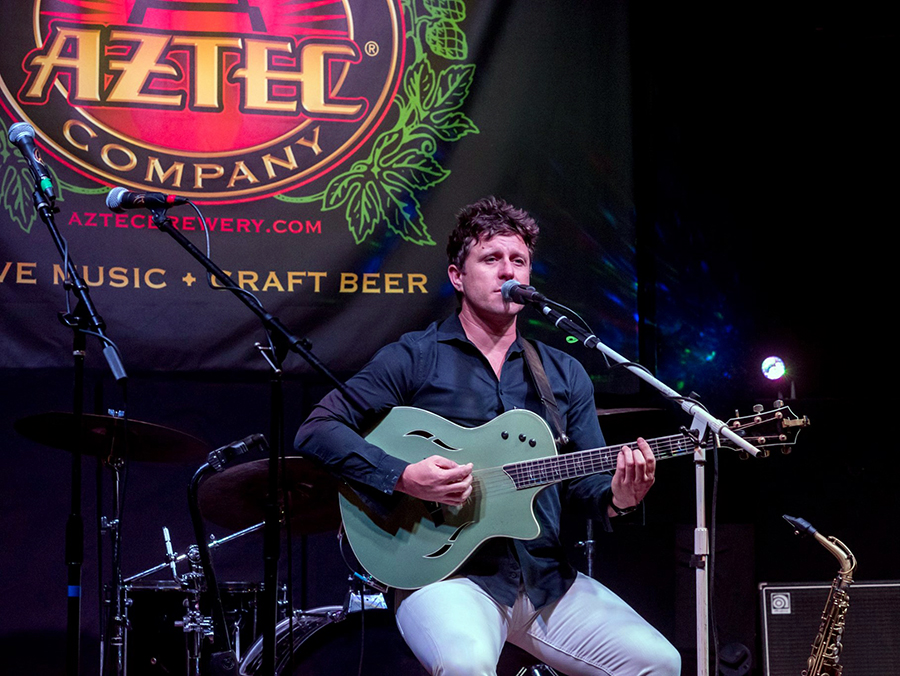
Jonny on guitar.
Although known primarily as a saxophonist, Tarr is actually an amazing multi-instrumentalist. If it makes music, he’s game to try. “My favorite instrument varies from month to month, to be honest,” he said. “My level of skill on each one I play does, too,” he quipped. “I have been really trying to improve my guitar playing a lot recently, making the leap to starting to play a bit of lead instead of just rhythm. I also feel like my sax playing was a bit neglected while I was learning to produce, mix, and master over the last few years, but recently I took on a lot more sax work to try to correct that. So, I would say that at the moment sax is my favorite, but, for sheer physical gratification and the way it makes me feel, singing is probably my overall favorite.”
Beyond voice and sax, Tarr used to accompany himself on keyboards for live gigs, but that’s changed recently. “Now, I have someone in my band who can do it much better than I,” he said. “Nowadays, I usually just reserve my keyboard playing for when I am songwriting at home.” Flute is also amongst his musical arsenal. “I might put a bit of flute on my friend Sandi King’s new jazz record,” he remarked. “I started playing flute because I was already playing sax, and I knew a load of people who doubled on flute. I thought, let me get one of those. The fingerings must be the same. They aren’t.” Meanwhile, Tarr gives a solid reason for taking up guitar. “I started on guitar because I wanted to be a songwriter and sax is not really a tool for that,” he pointed out. “Piano has just been something that has come along with all the rest of it. I mean, you have to know your way around a midi keyboard to produce music.”
Although Tarr did “a load of drama club musicals and little performances for school and the like,” his first paid professional gig was at a pub in the Riverside area of Cardiff in a horn section for a soul band called Pier 17. “The pub was pretty rough but loads of fun and it was really cool to be this 16-year-old kid hanging and playing with serious gig-weathered musicians. The next oldest person in the band was 28, I think. It was actually a really good band. It solidified my love for playing in a three-piece horn section (tenor sax, trombone, trumpet). I think it may still be my favorite thing to do in music. We did all the soul and Motown classics, like “Think,” “Beware of the Dog,” “Take Me to the River, “Love Man,” etc. It was a top-class bar band. A great apprenticeship.”
Liverpool
Post primary school, from 1996 to 1999, Tarr attended the Liverpool Institute for the Performing Arts (LIPA), founded by Paul McCartney. “It really was an amazing experience,” Tarr said. “We had the most fun ever and even found time to play some music on occasion. Liverpool is a party town that virtually never sleeps. There was mischief around every corner, and I wonder how any of us got out alive, to be honest. It was a wild time.”
Tarr was actually studying drama at Exeter University in the West of England, when his mother talked him into going to an audition at LIPA to study music. “I think that my mother’s intuition told her that I would be much happier doing music than acting. And she was right.”
As is traditional at the school, McCartney himself handed out diplomas at end of their stay. “He shook my hand and gave me my degree on graduation day,” he said. “I was a bit worse for wear because my brother and I had been up partying all night, so it was pretty surreal, actually. My mum was not happy with us. We had both fallen into the Albert Dock in the middle of the night and smelled appalling.”
The Other Music Scene
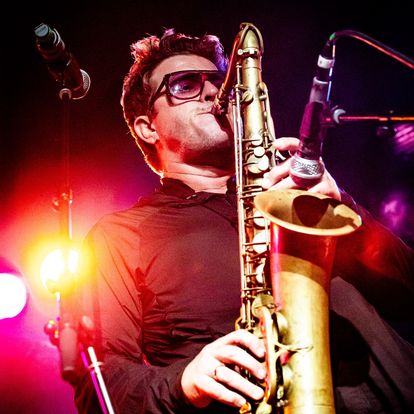
Jonny on sax.
What was Tarr’s music career like before he landed in San Diego? “A lot of highs and a LOT of lows,” he said. “Right out of college I was fired up. I brought the band that I put together at music college in Liverpool, on Fat Tuesday, down to a town called Brighton, about an hour south of London. Within the space of a year, I had secured a management deal and two years after that we were playing the biggest festival in Europe, Glastonbury. We went HARD.” In 2000, the band released a single titled ‘Thin Air.’ We toured Europe and came very close to getting major-label backing, but some very unfortunate things happened to halt our progress and eventually the band just fell apart. It was heartbreaking.”
He was soon playing low-key jazz gigs to make ends meet. “I got back into that, but I also discovered the loop pedal and started writing songs by myself and playing lots of solo looping gigs,” Tarr said. “I played sax in a few pretty well-known bands and got to tour Europe and even Japan, which was a bucket list thing for me. So amazing.” He also began playing saxophone with electronic music DJs. “That also helped get me traveling to lots of different places in Europe. It was great. I never really made much money, but I was having a great time and seeing lots of different countries through music.”
Next, Tarr appeared on the band Backini’s 2005 album, Re:Creation. I played saxophones and flute on the album. They were killing it for a while back home. We did a bit of touring, and we did a few cool gigs in Europe,” he recalled. “I remember one particularly messy trip to Athens. That was a really good time. Good people. They were a fun crew.”
He then joined up with acclaimed production/songwriting/DJ duo, the Nextmen, as part of their live band. “I played sax on the album they made in 2007, called This Was Supposed to Be the Future, and I also wrote and sang a song with them, called ‘Rockets.’” The song has racked up almost seven million plays on Spotify to date.
His last musical journey before heading to California was with a band called the Part Time Heroes. “I was featured on their debut album Meanwhile (2008). They were the ones I went to Japan with. I will always be grateful to them for that.” It was during this time frame that Tarr’s favorite gig to date took place. “It’s when I played at the Tokyo Crossover Jazz Festival. I was playing sax in a horn section with a DJ, an offshoot of the band Part Time Heroes. It was just so amazing. So, modern yet so different to anywhere else I had been. At one point I left a nightclub at around 5am and proceeded to get completely lost in Tokyo. My phone wouldn’t work, my debit card wouldn’t work. No signs in English whatsoever. It was monsoon raining and I was totally lost. I eventually handed myself into the police because I was wandering around for 10 hours or so and the only thing I knew was the name of my hotel. They thought it was hilarious. It was.” He hopes to return to Japan before too long. “The culture really appeals to me and their jazz scene is killer! They asked us to stay another couple of days to take part in a jam session in a tiny little basement club. There are such great players all over Tokyo.”
Despite these successes, the road work, lack of funding, and missed opportunities eventually led Tarr to consider giving up on his own songs. “Pretty soon after those Japanese gigs, I moved to San Diego and swore I would never do original music again because it can be such a grind. But then I gave in and formed my own group again. I have been seriously leading my own thing again for about the past five or six years.”
Family Life

Award winner Jonny with his wife, Aleicia at the San Diego Music Awards last year. Photo by Frank Rodrick.
Tarr considers finding the balance between his music and his family life to be important. “Music is all I do for income, yes,” he noted. “It used to balance really well with my family life until my wife and I had our daughter, Ivory. Since then, if I am being honest, it has become more and more tricky as time has gone on. Like a lot of musicians, my life has no real set schedule to it and that doesn’t jive too well with family life. We are constantly arranging and rearranging things to accommodate work, childcare, and all the other time eating parts of modern life. My wife has been incredibly supportive, understanding, and helpful but sometimes it can get the better of us and we are scrambling for solutions.”
How does Tarr’s wife and daughter feel about his music? “On balance, I think my family likes that I am a musician,” he said. “I will go to my daughter’s school and do workshops for the class, and she is always pretty jazzed, telling the other kids ‘that’s my daddy,’ which obviously feels great. For a recent school project, she wrote a poem about my green Taylor T5 guitar. On the other hand, she does get a bit annoyed and a little upset sometimes if I gig five nights in a row or go away for a week or two to play out of state. I do a lot of gigs in Mammoth and always try to take the girls with me. It can be a really nice little break and ski vacation on top of working. I know they like that.”
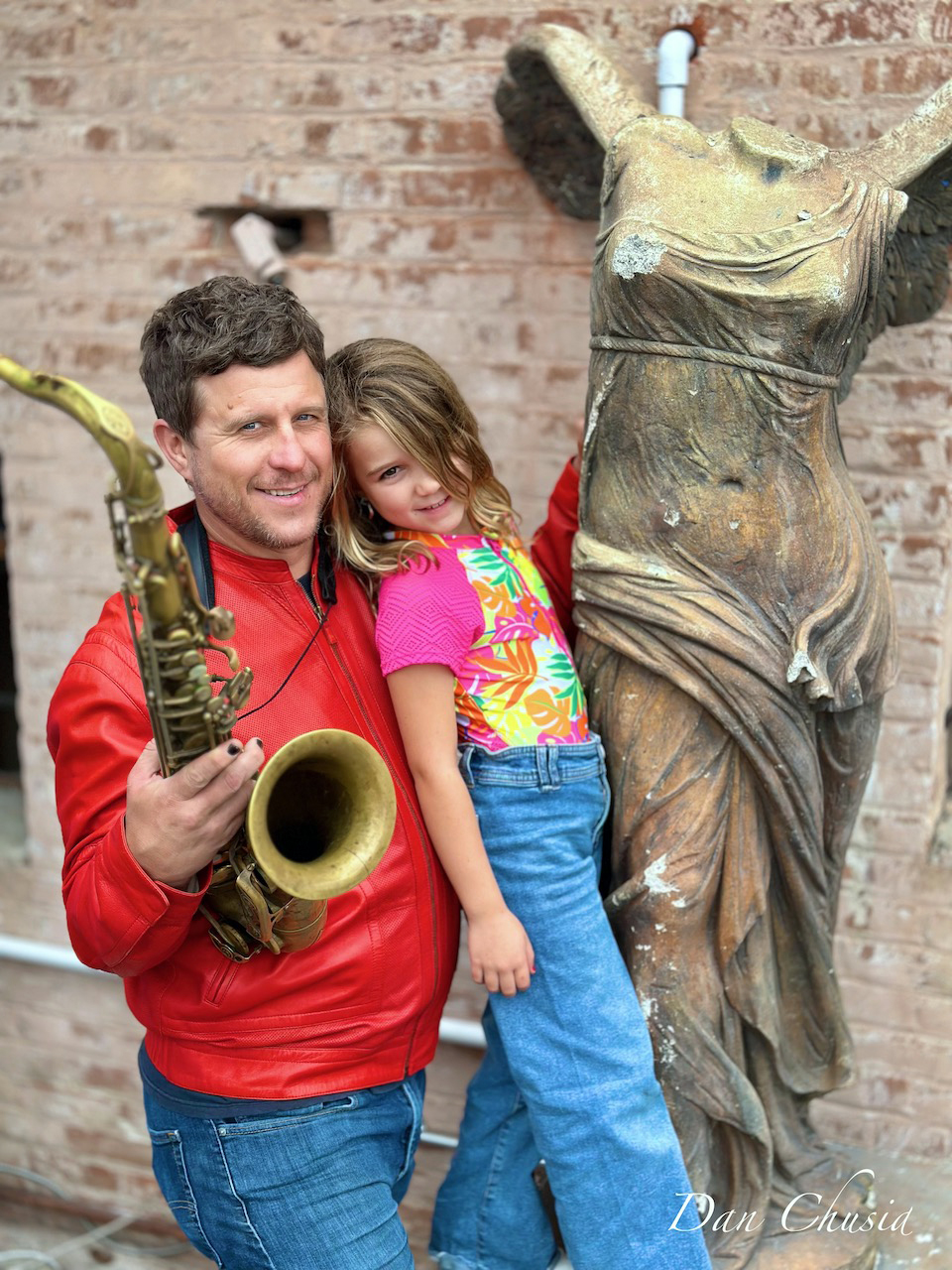
Jonny and his sweet daughter, Ivory. Photo by Dan Chusid.
As for his wife, “some days she likes it, some days not. She claims that I locked myself in the garage for close to two years to make my last album, and was obviously not too happy about that, but you have to try to strike a balance. I mean, if I am not working, I am either playing tennis or being with my family. I don’t really have a massive social life and I only have a couple of close mates, but I am totally okay with that.”
He is particularly happy that his daughter has taken an interest in music. “She has a Questlove Ludwig drum kit and has had lessons from Mile Clowminzer from my band, but recently she has shown more interest in the sax. I got hold of an alto sax for her, but she is still too small to reach all the keys. She can make a mean sound with it though. She also has a really in-tune singing voice so I am going to start teaching her songs during this summer break.”
Going Solo
Along with his band concerts, Tarr keeps busy with gigs on his own in a number of settings, including restaurants and lounges, such as the La Valencia in La Jolla. “My solo set up is very compact and maneuverable, so I can be in and out of a place efficiently without too much fuss,” he said. “These gigs are my bread and butter. I do a lot of them, and they keep my earnings turning over neatly. It is a great way to keep your vocals honed and gives ample opportunity for trying new things and even a bit of writing now and again. You know, there are ideas that pop up out of nowhere and give you a fresh perspective on a song or an idea you have been toying with. I also use it as a chance to really blow on the sax for big, long solos, which is not as easy to do where I currently live.”
While most of these types of shows focus on covers, Tarr does throw in a few originals. “I often include my own songs in my solo gigs but usually don’t tell the audience that it is my song until it has ended,” he said. “I really want to try to gauge the reaction while I am playing it. I tend not to talk that much when I am playing solo, simply for the fact that I’m often there for ear candy if not simply background music. Having said that, these types of gigs are different every time.” He occasionally takes his solo set up to bigger venues. “At shows, such as the Belly Up or the Music Box, where I am playing my solo set, I will usually try to showcase my original music front and center. And you can bet that I tell them all about it. It is quite nice to be able to say that the song I’m about to play helped me win a San Diego Music Award. I have shied away from blowing my own trumpet too much over the years, but sometimes you just have to go for it.”
The key to Tarr’s solo performances is his use of looping technology to achieve a fuller sound. “When I lived in London from 2005 to 2011, I made my first album,” he said. “To showcase the album around London, the band needed to be 11 strong—horns, backing vocalists, two guitars, percussion, and everything that was on the album. Quite shortly,after the album came out, I made the decision to come out to San Diego permanently, and I didn’t know anyone.” Tarr needed to find a way to be able to perform and make money. “I also needed to be able to play the original songs for that first album, which is called Move Yourself, by myself, so I got a loop pedal and never really looked back,” he remarked. “I can incorporate pretty much my whole skill set on a looper and as they have developed, there is more and more you can do with one. I use one for live gigs maybe three or four times a week. I wouldn’t really know what to do without one on a solo gig these days.”
The Rules
Although Tarr’s music career is now decades long, the current round of acclaim began in 2018. That year he hit the ground running with new music, releasing an album titled Move Yourself, an EP called Sky High, and a single, “Why Don’t You Wait.”
The following year saw the release of a second single, “Stick Your Neck Out,” with 2020 delivering both The Jonny Tarr Quintet’s album, Live at Studio West, and also the album Tough Stuff. 2020 also saw Tarr score his first San Diego Music Award, taking home the trophy for Best Pop Artist, a feat he repeated in 2023. Most recently, having signed to Pacific Records and earning two SDMAs in 2024 for the previous year’s release, The Rules. He not only won the Best Pop Album category, but he also took home the top prize: Album of the Year.
How does Tarr feel about his SDMA wins? “I’ve gotta say, they all feel really good,” he remarked. “But Album of the Year feels particularly special. It reassures me that I have not just been banging my head against a brick wall and someone, somewhere thinks that what I made was worth the effort. It lets me know that it is okay to keep going, trying to improve and working to create something that others will enjoy. Any musician will tell you that music can be very tough sometimes. We need these little bonuses to keep us moving forward with it. It has given me momentum.”
A big part to Tarr’s upward mobility in this time frame is down to his band. “We’ve been together for about six years,” he said. “I have had quite a few personnel changes because these musicians are bad asses and are much in demand. But there is a core group that has been with me for about six years. They do me a huge honor by agreeing to play my music as they really are all some of the very best San Diego has to offer. Some of the best advice I ever got was: always be the worst player in your own band. I love them all.”
Players on The Rules include Ken Dow and Steffan Hughes (bass), Matt Clowminzer and Joshua Taylor (guitar), Matt DiBiase (vibraphone), Tori Roze (trumpet), Melissa Dow (strings), Monette Marino (percussion), and Miles Clowminzer (drums).
Other key musicians performing live with Tarr in his 11-piece band include George Logemann (keyboards), Matt Clowminzer (guitar), Ken Dow (bass), Sandi King (backing vocals), and Joshua Taylor (guitar and backing vocals). Additional regular band members and collaborators are Ariel Levine (guitar), Nick Costa (guitar), Harley Magsino (bass), Keli Ross Mau (keyboards), Kevin Dow (drums), and Cody Betts.
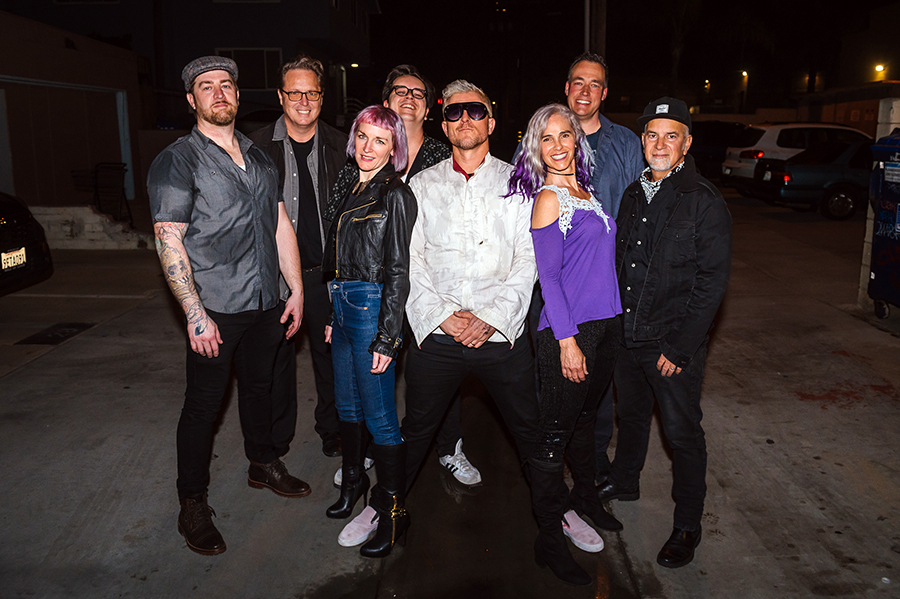
Album release for The Rules with the band members. Photo by Alex Matthews.
With so many people in his band, how hard is it to coordinate all the moving parts? “I don’t find the gigs that hard to organize,” he said. “I trust my crew to deliver every time, and I feel I have some of the best of San Diego’s talent on the squad. They are like family. I think that the real key to a band’s success is the personalities involved and dynamic you build, even before the level of musicianship, to be honest. And although I have zero worries about the ability of any of them, I try to concentrate on putting everyone at ease and make sure they are relaxed and comfortable with each other and myself before anything else. Booking gigs is not the hard part with such a big band. I spend quite a lot of time getting subs of equal ability involved, so I can usually say yes to a gig and THEN see if everyone is free. The really hard thing is getting everyone to a rehearsal!! That can be a nightmare, with lots of near misses before everyone can agree upon a date!”
Has Tarr started on the follow up to The Rules? “I have probably made an album’s worth of demos since I made the album,” he said. “However, some of them will probably go to other artists and maybe some I will keep. I am hoping to work as a writer and producer for other musicians, so in the foreseeable future I am going to be focusing on that. I have played probably thousands of gigs, so I feel ready to try to be more studio based for a while.”
Songwriting and Production
Tarr’s move into music production is for pragmatic reasons. “I wanted to have as much control as possible over what I was putting out into the world,” he explained. “I avoided coming to grips with production for such a long time as I am quite highly strung and sitting still in front of a computer can be quite agitating for me. But, while I was back in Wales in 2020, I bit the bullet and asked my friend, Julian Fyson, to recommend a production teacher. Julian ran a collective for music education at the time and he hooked me up with a very good teacher, Matthew Bentley, who also works at one of the biggest music schools in the UK. I have been addicted ever since and just wish I had started sooner. We still have ZOOM lessons now that I am back in California, but the time difference sometimes causes a problem.”
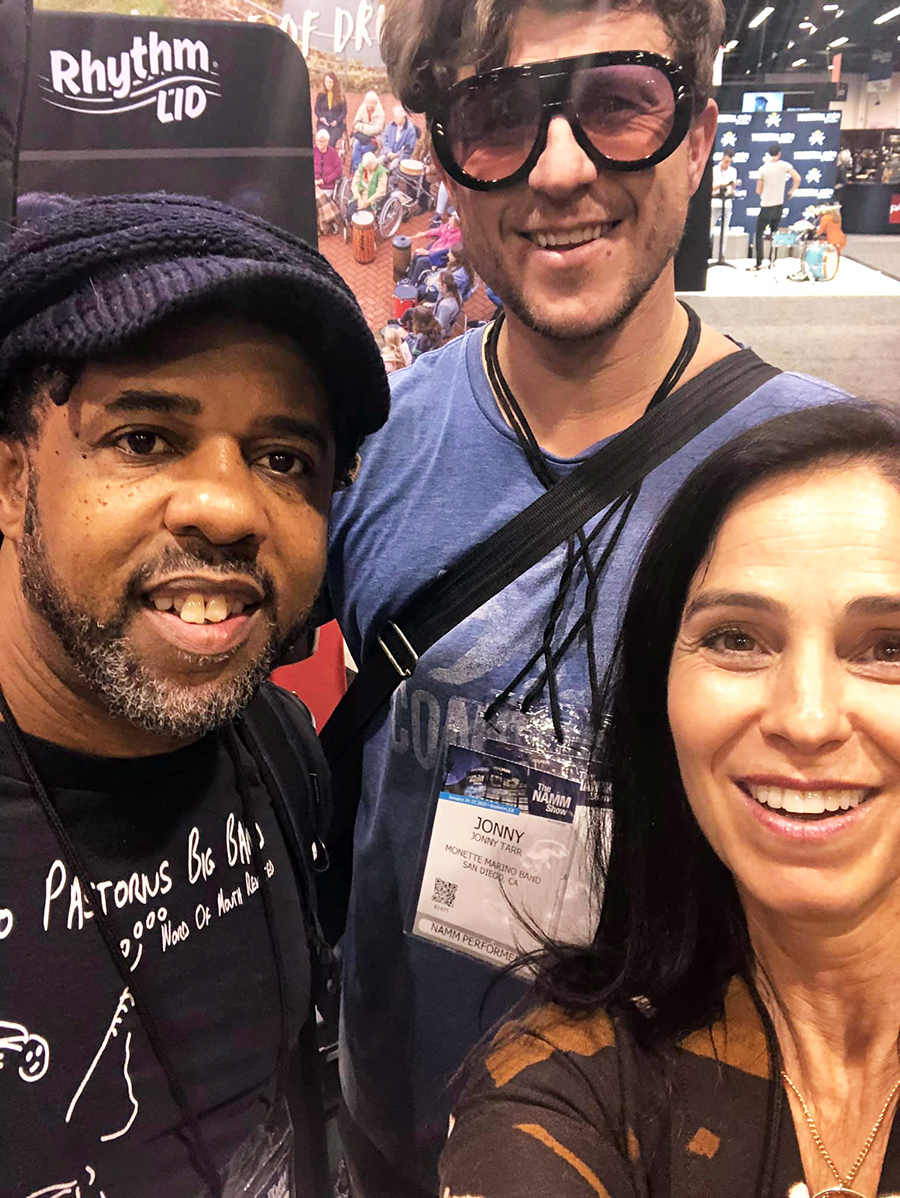
Jonny with Victor Wooten & Monette Marino.
Tarr’s home studio is a work in progress. “I am always reconfiguring my home setup, but you need so little hardware these days to be able to make broadcast-quality music. It’s all ‘in the box’ as my teacher would say.” He’s currently working on an album for Sandi King. “It’s going to be the first pure song-based record that I will produce for someone else,” he noted. Other recent production work includes “quite a bit of music for San Diego dance company, Disco Riot, and I also recently helped produce, orchestrate, and arrange a musical called Bright Young Things for the Blindspot Collective.”
In addition to production, Tarr is honing his songwriting skills. “I am becoming much more prolific now that my home production skills have had a serious boost within the last three or four years,” he said. “It used to be a lot harder because the workflow was much slower. Now that I can knock together a demo in an hour or so, the output has increased. Add to that the fact that now I am being asked to write, record, and produce for other people, it has required my output to increase quite a bit. I rarely write on guitar or piano, so having the ability to self-produce in a digital audio workstation, like Logic, is essential to me.”
What inspires him to write? “Thinking back on it, what has usually inspired me to write is hearing a single song in a genre I had not been familiar with before and thinking I want to do something like that! It’s either that or some kind of personal upheaval.” He points out that the music on The Rules is actually very bittersweet. “A lot of it was written about deep personal sadness and loss. Sometimes it takes that amount of emotion to pull a whole piece of work out of you. I say ‘bittersweet,’ because I tried to weave it all inside of catchy vocal hooks, warm synths, and danceable grooves.”
Side Projects
As busy as his own music keeps him, Tarr is also a part of numerous other projects, including Pink Floyd tribute group, The Floyd Syndicate. What is it about Pink Floyd that inspired Tarr to helm such a combo? “It is just the music itself, to be honest,” he said. “It is otherworldly and has so much weight to it, you know? I was invited to join the band as sax player and auxiliary guitarist-keyboard player in 2018, when it was known as Pink Froyd.” Shortly after becoming part of the group, he was whisked off on tour, opening for Foreigner across Canada in 2019, performing the whole of Dark Side of the Moon, nightly.

Jonny w Sandi King, Josh Taylor, Josh Weinstin et al. in the Pink Froyd band.
Ironically, Tarr wasn’t a big Pink Floyd fan before becoming part of Pink Froyd. “I must admit that I didn’t really know much about Pink Floyd until I joined the band. I had just thought they were a kind of branch of classic rock that people other than myself obsessed over, and that kind of put me off, finding out too much more about them. I was a jazzer, a funker, a soul boy, and a hip-hop head and had not felt the need to acquaint myself with Pink Floyd. But how wrong I was.” He credits the change of heart to “Mr. Tom Quinn, the leader of Pink Froyd at the time and still the best Dave Gilmour, who is not actually Dave Gilmour that I have ever seen ‘in the flesh,’” Tarr said. “I was immersed in the utterly unique world of Pink Floyd and even though the band had its ups and downs and many, many, personnel changes, I kept coming back to it because of the music itself. Now that Tom has moved on, it has fallen to me to keep Southern California’s Pink Floyd flag flying.” Tarr now sings most of the lead vocal parts. “I have also renamed and rebranded the band as the Floyd Syndicate. I wanted to call it The Floyd Cartel, but too many people begged me not to,” he joked. “We aim to keep playing the music as faithfully as we can, complete with note-for-note solos from the studio recordings and a multi-media show put together by none other than the Swiss army knife of talents that is Sandi King.” King also sings with the band. “She raised the roof at last year’s Mammoth Village Fest with her absolutely face-melting rendition of ‘Great Gig in the Sky’ from Dark Side of the Moon,” he said.
Tarr can also be heard playing sax and rhythm guitar in Huey Lewis and the News tribute group, The Heart of Rock and Roll. “It’s a total blast,” Tarr remarked. “All the songs are so much fun to play. The band has a really strong following and I am getting to see parts of the U.A. that I have not yet been to, so it is ticking many boxes for me.” He credits his keyboard player, George Logemann, for “putting me forward for this one, and another large thank you to Roger Langdon, who runs the band and plays Huey Lewis himself.”
Additionally, Tarr performs in percussionist Monette Marino’s combo, “which I believe could be a contender for the best band in San Diego,” Tarr said. “They are all monsters!”
Though it’s his live work that keeps him busiest, Tarr has also spent much quality time in the studio working on releases other than his own. Queried about his studio work, it’s clear a major Discogs update is in the offing. “Oh, man. That might even be in the hundreds of sessions,” he said. In addition to the aforementioned recordings, he’s played on numerous records for friends and colleagues, including the King Taylor Project and Sandi King’s upcoming jazz record. “More recently, I have also been writing a couple of songs with a really slick producer from London called Simon Tagg, who goes by the name Kouncilhouse. They are as yet unreleased, but they will be available soon. The working titles are, Going Solo and Push On.”
What’s Next
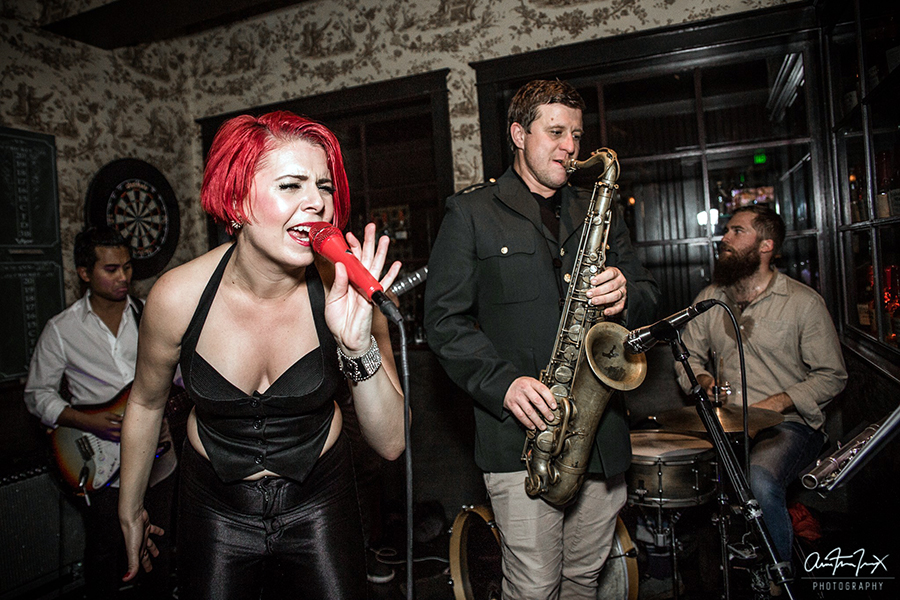
Jonny plays with Whitney Shay. Photo by Atruax Photography.
Moving forward, Tarr will continue to promote The Rules, with more recording and plenty of club and festival dates ahead. He hopes to get new videos in the mix as well. “Sandi King made me a whole bunch of lyric videos for the songs from the album, but I would like to do a scripted story-boarded one too,” he said. He’s had recent indirect video experience. “I wrote a song called “Frozen Heart” for Sandi on her birthday last year and she ended up filming a killer video for it. My cousin, Dominic North, is a world-renowned dancer, and he choreographed a few dance moves for her. It was so epic, I would love to do a video like that next.”
Meanwhile, he hopes to get his own band on the road, touring the country sooner than later. “I am going to be doing a bit of touring with the Heart of Rock ‘n’ Roll, and the aim is always to take my own band on tour at some point, but there is always so much going on here in San Diego that I have not gotten it together yet. I am not terribly good at forward planning. I like to just get my teeth stuck into what I have in front of me, and I usually need a bit of help with organizing future goals.” Now a seasoned tour veteran, he considers age to be a factor as well, but only to a point. “As I get a bit older, the prospect of hours in a van or sitting in airports and hotels/Airbnb’s gets a little bit less appealing, but I would never say no to the opportunity to visit a place I have never been before to play music. I think that is the real goal that I have always striven for.”
Epilogue
With multiple SDMA wins, a full live schedule, and a lot of promise ahead, it’s clear that Tarr’s hard work has paid off. What kept him going through leaner times?
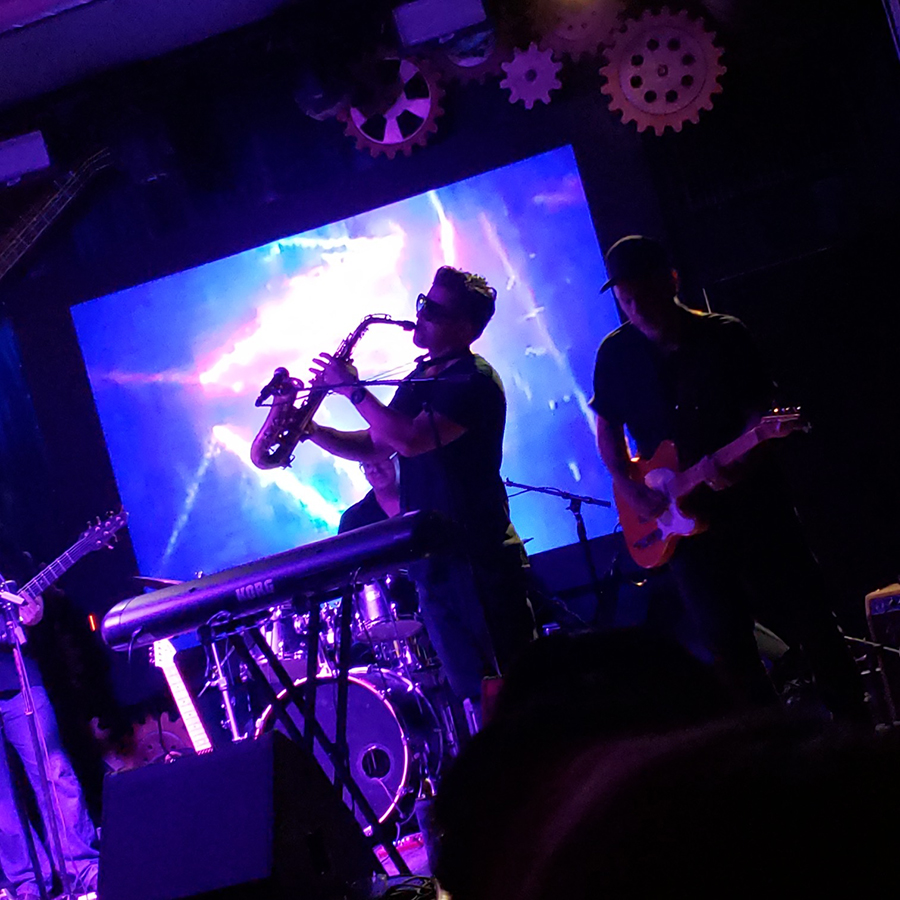
“Sheer stubbornness,” he said good naturedly. “I trained to be a musician and I have fought to make it work whatever the obstacle. I am resilient; I have had so many disappointments and let downs in music, but there is nothing else that really stirs my soul the way that music does. I am not often given to trite clichés like that, but I am not sure how else to describe it. Let’s say this: I would much rather be playing my 200th solo-looping restaurant show of the year to a really quiet venue than in an office of any kind or an admin job of any kind.” He considers art over commerce. “I have never been massively interested in money. I mean, I wouldn’t say no to a bit more, but it has never been my goal. I am much more satisfied with making stuff. I am of the opinion that if you do what you love and make serious efforts to continually improve, you will get rewarded enough to keep on doing it.”
How does he feel about his move to San Diego? “In a way it saved my life,” he said. “I was at a very low ebb and if I had not been lucky enough to be offered the opportunity to move out here, thanks to my amazing wife Aleicia, I don’t know how things would have turned out. BUT, I do know that it is very unlikely that I would have a full-time career in music. In my experience it was much harder to make a living from music in the UK. We are VERY lucky in San Diego that the musical climate is much more financially viable. You just have to work hard and keep moving forward. So, moving to San Diego was a beautiful thing for me. I love it here.”
The Rules Spotify album link:
“Gonna Be There for You” lyric video:
YouTube channel:
https://www.youtube.com/channel/UCIYnWlKlvpKHJ-fbMd3sabQ
www.facebook.com/jonnytarrmusic
www.instagram.com/jonnnytarrmusic
www.jonnytarr.com





